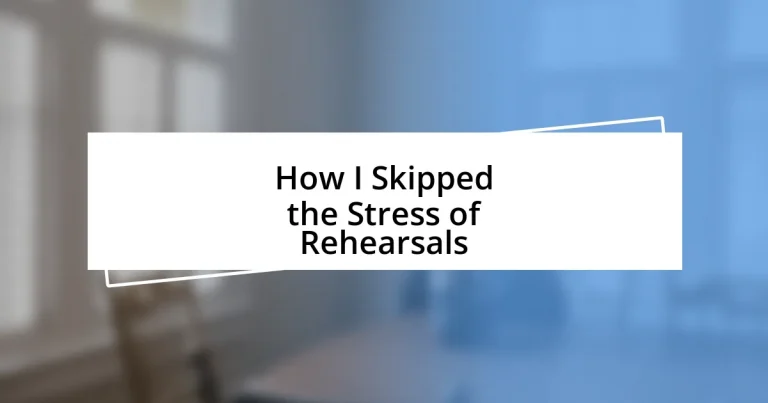Key takeaways:
- Rehearsal stress is common among performers, often stemming from high expectations and fear of disappointing others.
- Effective preparation strategies, such as setting clear goals and practicing mindfulness, can significantly reduce anxiety and enhance performance.
- Cultivating a supportive rehearsal environment through open communication and positive reinforcement fosters growth and collaboration.
- Incorporating self-care routines, like meditation and physical activity, is crucial for managing stress and maintaining focus during rehearsals.
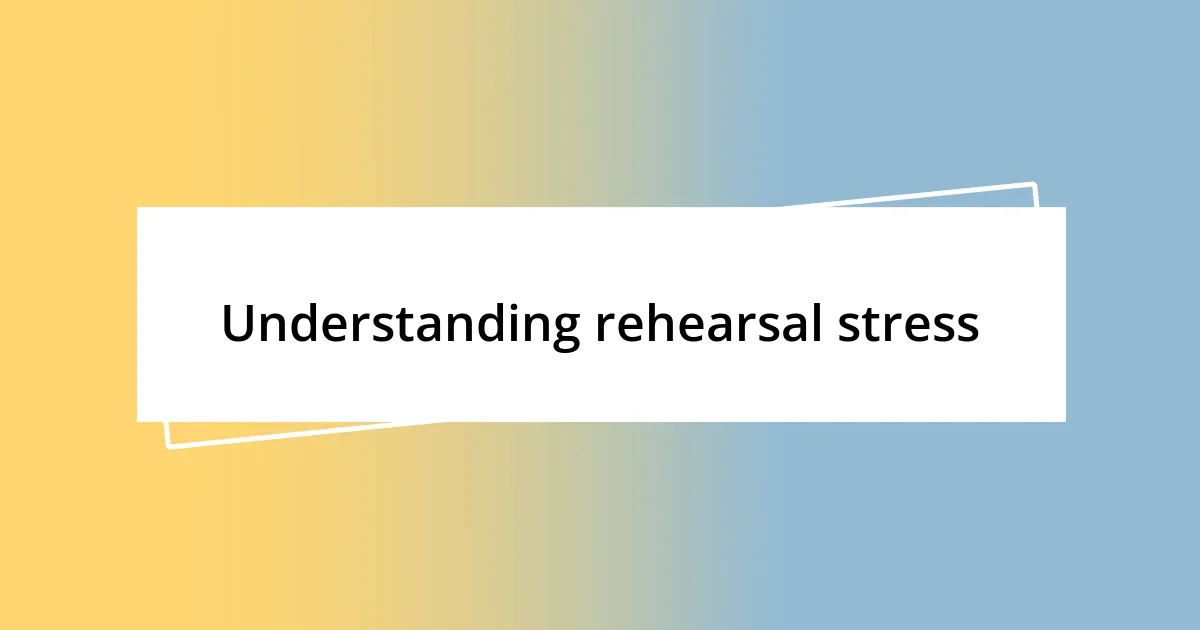
Understanding rehearsal stress
Rehearsal stress often sneaks up on performers, manifesting as anxiety and self-doubt. I remember preparing for my first big performance; nerves turned my palms sweaty, and my mind felt like it was racing a mile a minute. How was I supposed to shine when all I could think about were the potential pitfalls?
The pressure of perfecting every note or movement can be overwhelming. I’ve found that this stress often stems from a desire to meet not only my own expectations but those of the audience too. Just the thought of disappointing someone can be paralyzing—can you relate?
It’s fascinating how rehearsal environments can amplify our worries. I often saw my peers pushing themselves to the brink, losing sight of why they loved performing in the first place. I realized that understanding the root of this stress is crucial; recognizing it as a natural part of the journey can help us manage it better. What if instead of seeing it as a burden, we embraced it as part of our growth?
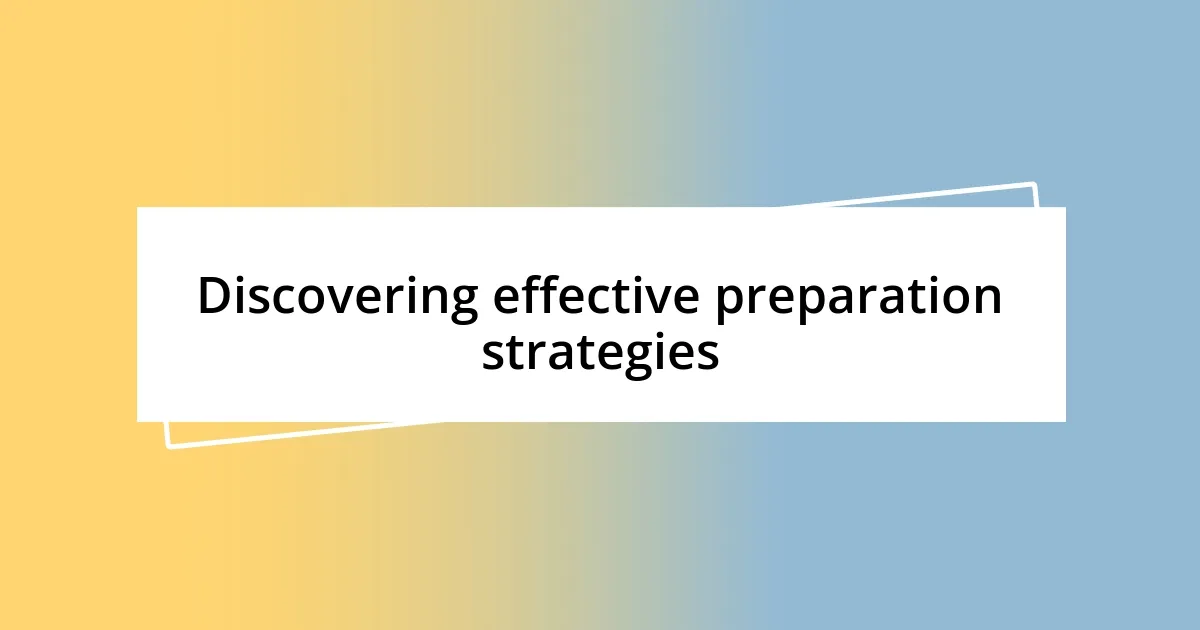
Discovering effective preparation strategies
Discovering effective preparation strategies has been a game-changer for me. Rather than cramming everything into last-minute sessions that only fueled my anxiety, I’ve honed a few techniques that genuinely enhance my performance while keeping stress at bay. For instance, I started breaking my preparation into manageable chunks, focusing on smaller sections of my material each day. It felt less daunting and allowed me to build confidence piece by piece.
Here are some strategies I’ve found helpful:
- Set Clear Goals: Instead of vague intentions, I establish specific objectives for each practice session.
- Visualize Success: Imagining my performance in vivid detail helps calm my nerves.
- Practice Mindfulness: Taking moments to breathe and center myself creates a more focused rehearsal environment.
- Record Myself: Listening to my recordings afterward offers unparalleled insight into areas of improvement.
- Seek Feedback: Sharing my progress with trusted friends or mentors makes me feel supported and opens avenues for growth.
Implementing these strategies enabled me to shift my mindset from fear to empowerment. I often left rehearsals feeling accomplished instead of defeated. Embracing preparation as a journey, rather than a race, uniquely transformed my approach.
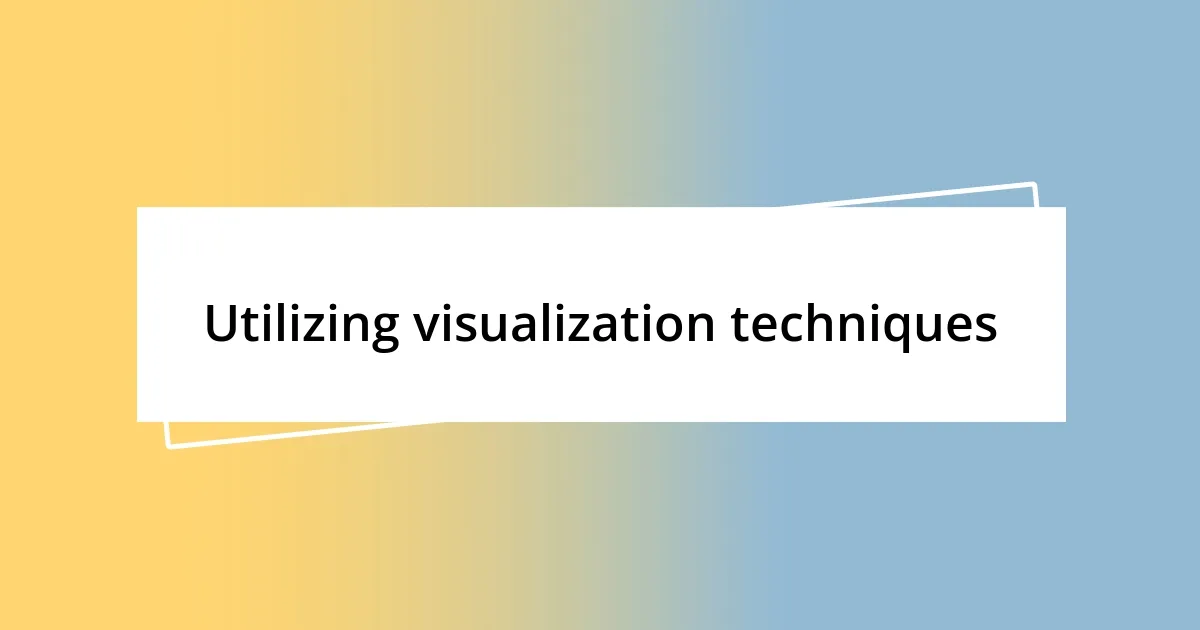
Utilizing visualization techniques
Utilizing visualization techniques has become one of my go-to strategies in alleviating rehearsal stress. When I first stumbled upon this method, it felt a bit odd to simply imagine my performance instead of physically practicing. But I decided to give it a shot during a particularly nerve-wracking week leading up to a big show. Picture this: I closed my eyes, took a deep breath, and envisioned myself on stage, every note executed flawlessly. The feeling of confidence that surged through me in that moment was electric.
I’ve learned that visualization can significantly impact our emotional state. When I visualize, I don’t just see myself performing; I feel the rush of excitement, the audience’s applause, and even the warm stage lights on my skin. It’s as if I’m rehearsing my success before even stepping on stage. This mental rehearsal became a pivotal part of my routine, allowing me to enter situations with a sense of calm that I’d never experienced before. Have you tried imagining your success? For me, it reshapes my nervous energy into something positive.
Now, let’s break down the benefits of visualization versus traditional rehearsal techniques. Below is a comparison table that summarizes my findings:
| Technique | Benefits |
|---|---|
| Visualization | Reduces anxiety, builds confidence through mental rehearsal |
| Traditional Rehearsals | Focuses on muscle memory, but can increase stress with pressure |
Using visualization alongside physical practice has allowed me to create a well-rounded preparation approach, combining the strength of both realms. It’s a journey of self-discovery, showing me that sometimes the most powerful tools lie within our minds.
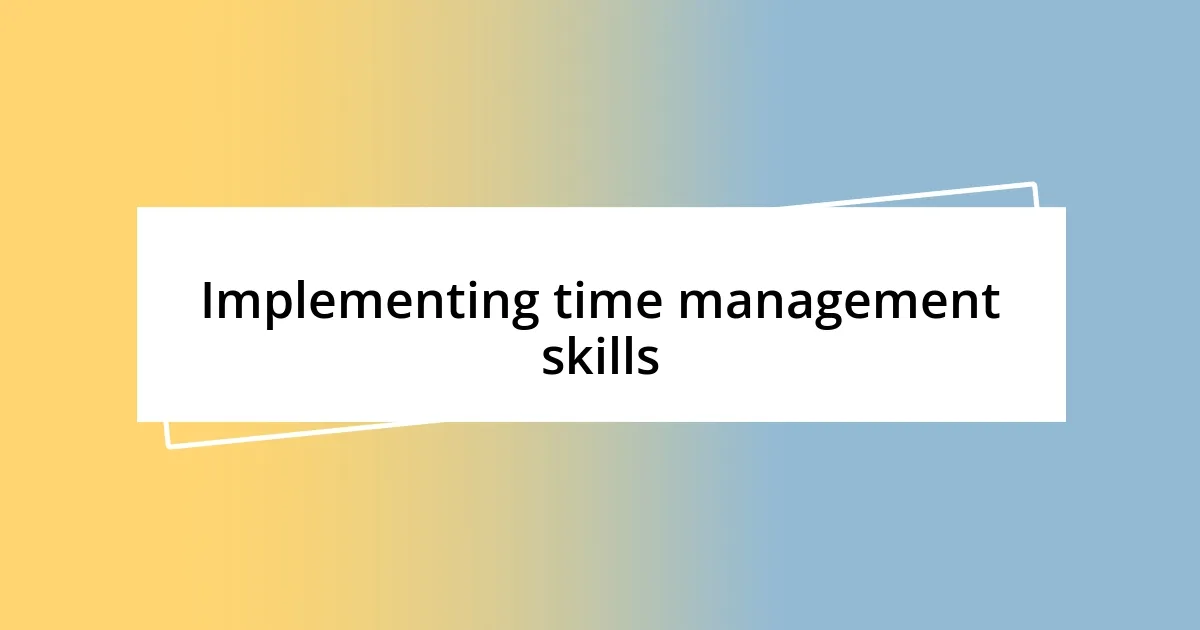
Implementing time management skills
Implementing effective time management skills has dramatically strengthened my rehearsal process. One memorable instance was when I created a weekly schedule, breaking down my practice into specific time blocks. It was a game-changer; instead of feeling overwhelmed, I had a clear path forward. I often wonder how many stressors I could avoid just by allocating my time more wisely, and this experience solidified the importance of scheduling in my routine.
Another technique I found helpful was prioritizing tasks based on urgency and complexity. I began each week by identifying the areas I needed to focus on and ranking them. For example, if I realized a certain piece required more attention, I would dedicate extra time to it early on. By doing this, I noticed that I not only prepared better but also felt less pressure as the performance date approached. Have you ever tried categorizing your tasks? It can lead to a smoother, more productive experience.
Moreover, I learned to incorporate breaks into my schedule without guilt. Initially, I felt pressured to work nonstop, thinking that meant I was productive. However, I soon discovered that taking short breaks improved my focus and retention. After a 10-minute walk, I would return rejuvenated and ready to tackle challenges with a fresh perspective. This small adjustment was revolutionary for me; it shifted the narrative on productivity from “hustle and grind” to a more sustainable “work and rest in harmony.”
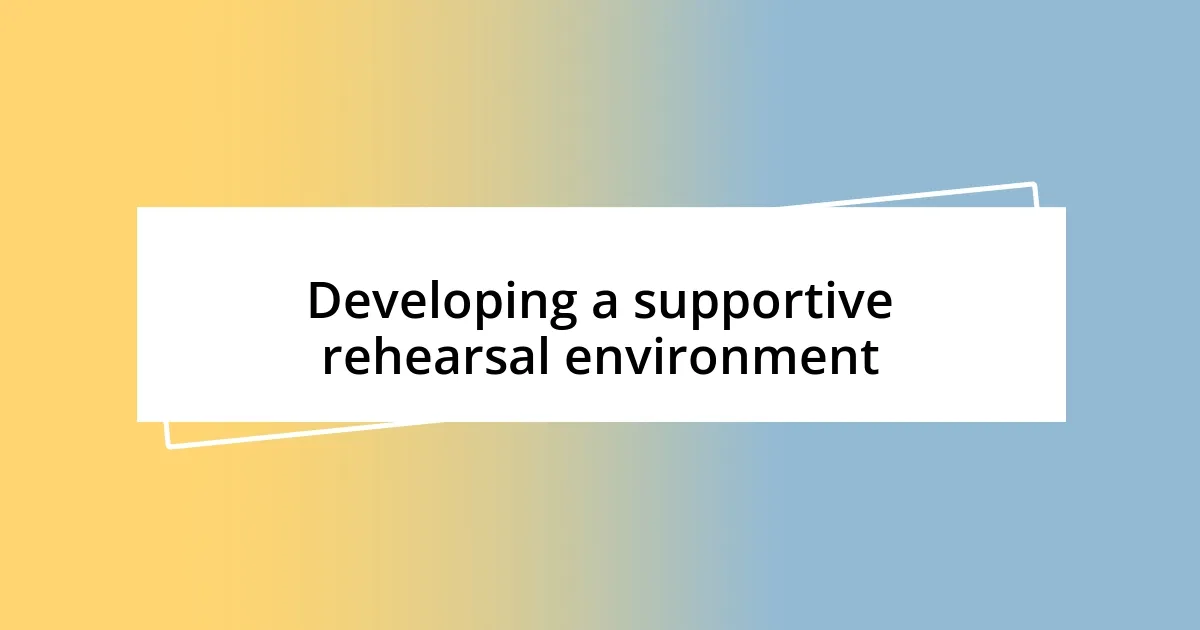
Developing a supportive rehearsal environment
Creating a supportive rehearsal environment has been pivotal in my journey to managing stress. I recall a particular rehearsal where I encouraged my peers to share their fears openly. The moment we started discussing our insecurities, the tension in the room melted away, replaced by understanding and camaraderie. Isn’t it amazing how vulnerability can create such a strong bond? Establishing a space where everyone feels safe to express themselves transforms rehearsals into a collaborative and uplifting experience.
I also believe in the power of positive reinforcement among team members. During a challenging stretch, I made it a point to celebrate even the smallest victories. I remember praising a fellow musician for nailing a difficult passage during practice. That simple acknowledgment boosted her confidence and encouraged others to strive for their best, too. Have you noticed how a few kind words can turn someone’s day around? This kind of atmosphere fosters not only individual growth but collective joy in our work.
Moreover, I found that incorporating fun activities into rehearsals lightened the mood significantly. One evening, we took a breather and played a quick game that had everyone laughing. It was a refreshing change, and it allowed us to reconnect and recharge. Those small, joy-filled moments in what could feel like a monotonous routine remind me that creativity thrives in an environment where people feel relaxed and energized. Isn’t it true that sometimes a little play can lead to some of our greatest breakthroughs?
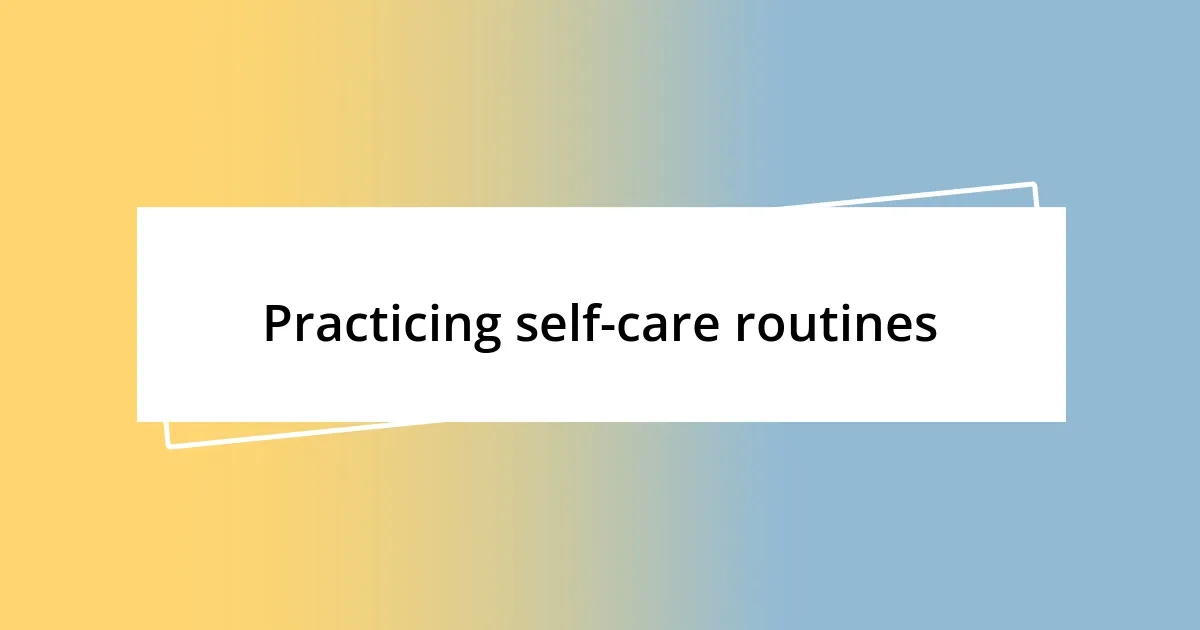
Practicing self-care routines
Practicing self-care routines has become a cornerstone of my approach to managing rehearsal-related stress. I remember one particularly hectic season when I decided to try meditation. Just a few minutes of focused breathing each day created a sense of calm I didn’t know I needed. Have you ever felt the weight of anxiety lift, even if just for a moment? It’s transformative.
Another self-care technique I embraced was journaling. After each rehearsal, I would spend a few minutes jotting down my thoughts and feelings. Not only did it help me make sense of the day’s ups and downs, but it also gave me an opportunity to reflect on my growth. I discovered that writing wasn’t merely an outlet; it became a means of recognizing my progress and reinforcing my strengths. Have you tried capturing your experiences on paper? I found that it can lead to some surprising insights.
One of the most significant shifts I made was incorporating physical activity into my daily routine. On days when rehearsals left me drained, taking a short jog or doing a bit of yoga was my go-to escape. The endorphins kicked in, and suddenly, I felt re-energized and ready to tackle my next task with a clearer mind. It brings to mind the idea that a little movement can be a powerful antidote to stress. What’s your favorite way to recharge? For me, movement became a vital piece of the self-care puzzle, reminding me that my mind and body are deeply connected.
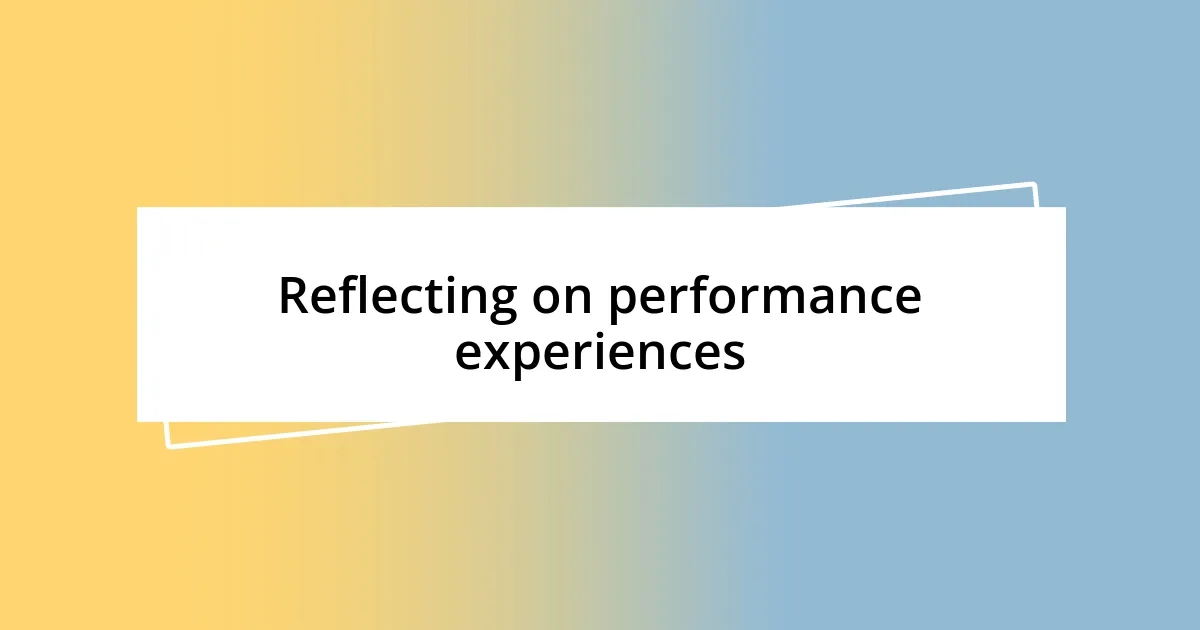
Reflecting on performance experiences
Reflecting on my performance experiences often brings a wave of nostalgia intertwined with valuable lessons. I can vividly recall a time when after a stressful show, I sat down with my fellow performers to unpack what we had just experienced. As we shared our thoughts, I realized that expressing our highs and lows helped solidify our team bond. Have you ever taken a moment after a big event to really digest how it felt? It’s a powerful practice that promotes not just personal growth but also deeper connections.
In another instance, I remember being part of a performance that didn’t quite go as planned. I felt disappointment creeping in as we analyzed our performance collectively. But instead of focusing solely on the negatives, we celebrated the moments that went well, which helped shift the atmosphere from discouragement to encouragement. It made me think, isn’t it interesting how reframing our narratives can lift spirits? Reflecting on both the successes and challenges allows us to appreciate how far we’ve come while fueling our desire to improve.
I find that even the smallest details of a performance can leave a lasting impression. For instance, I once stumbled over a line, but I learned later that it brought a moment of laughter that resonated with the audience. That experience led me to consider how imperfection often becomes part of our unique charm on stage. It’s fascinating to think about how our perceived mistakes can actually create memorable moments. Have you ever experienced something similar where a mistake turned into an unexpected highlight? These reflections only deepen my appreciation for the journey of performance.












